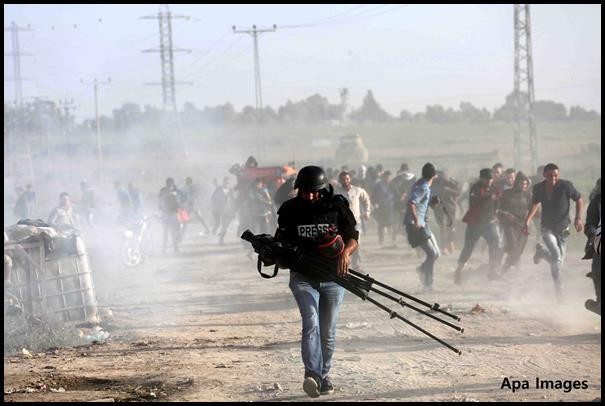May 3rd marks World Press Freedom Day (WPFD), an occasion to “celebrate the fundamental principles of press freedom, to evaluate press freedom around the world, to defend the media from attacks on their independence and to pay tribute to journalists who have lost their lives in the exercise of their profession”[1]. This year, marking the 18th anniversary of the UN General Assembly’s proclamation of WPFD, the theme “Information as a Public Good” serves as a reminder of the need to assess access to information in the Gaza Strip, occupied Palestine, the role of the occupation in limiting information, and ways to protect journalism in particular as a public good.
In the Gaza Strip, this anniversary coincides with a continued limiting of access to information due to Israel’s prolonged occupation of Palestine, closure and blockade of Gaza, and repeated attacks on Palestinian journalists. These policies and practices have had a devastating effect on the ability of the Palestinian media to deliver on people’s right to information. Firstly, the catastrophic living conditions, frequent violence, and political volatility of life in Gaza have forced the local press to zero-in on political reporting, to the detriment of the population’s access to information concerning education, health, economics, and social issues. Gender issues are particularly adversely impacted, both because of lack of information but also because of the poor portrayal of women in the media and lack of diversity in opinion.[2]
Israel’s systematic weakening of the Palestinian economy, especially in Gaza, also leaves very little room for new media actors to emerge on a sustainable basis, and thereby limits the pool of actors that can respond to the changing information needs of the Palestinian audience.[3] The poor economy has also resulted in an unemployment rate of 46.4% in the field of journalism, as of December 2020, which limits the diversity of opinions. Further, while this unemployment rate covers both the West Bank and Gaza, it is expected that it is higher in Gaza given the severe labor market distress here.[4]
Importantly, Israeli attacks on Palestinian journalists compromise the capacity of media professionals to deliver timely and accurate reporting3. For example, during the Great March of Return protests, the Israeli military killed two journalists and injured 173—of whom 43 were injured more than once, dramatically undermining their work.[5]
In the meantime, the pervasive political divide between Palestinian factions has further aggravated Israel’s structural barriers to Palestinians’ access to information. The internal division has in practice created a reality in which “a number of Palestinian media outlets tend to be biased towards one political orientation and are reported to design their programmes on the basis of their political leaning rather than the needs of their audiences”.[6]
Through this year’s World Press Freedom Day, Al Mezan notes with concern the continued trajectory of Israeli policies and practices of domination over Palestinians’ right and access to information—from controlling the Palestinian spectrum, to restricting movement of equipment and journalists, and to perpetuating physical violence and economic exclusion against members of the press. Al Mezan stresses that the economic viability of the news media and the enhancement of media and information literacy capacities, two key topics of this year’s WPFD commemoration, are systematically undermined by Israel’s illegal, ongoing blockade and closure of Gaza.
Mindful of the role that press freedom plays in exposing human rights violations, promoting principles of human rights and democracy, and creating more open and better informed societies, Al Mezan seizes this occasion to call on third States and the international community to uphold their moral and legal obligations towards the occupied Palestinian people, including by guaranteeing respect for the right to freedom of opinion and expression—which entails the freedom, protection, and development of the Palestinian media—and by ensuring accountability and justice for all violations of international law in the occupied Palestinian territory, including those that are press-related.
[1] UNESCO. 2021. World Press Freedom Day. Retrieved from https://en.unesco.org/commemorations/worldpressfreedomday
[2] See UNESCO. 2014. Assessment of Media Development in Palestine. Retrieved from https://www.menamedialaw.org/sites/default/files/library/material/assessment_of_media_development_in_palestine.pdf
[3] See Euromed Audiovisual III. 2013. Statistical Data Collection Project on Film and Audiovisual Markets In 9 Mediterranean Countries: Country Profile 5 - Palestine. Retrieved from https://rm.coe.int/CoERMPublicCommonSearchServices/DisplayDCTMContent?documentId=090000168078352e
[4] Palestinian Central Bureau of Statistics. 2021. Labor Force Survey (October – December 2020) Round. Retrieved from http://www.pcbs.gov.ps/portals/_pcbs/PressRelease/Press_En_15-2-2021-LF-en.pdf
[5] Al Mezan Center for Human Rights. 2019. Attacks on Journalists During the Great March of Return in Gaza Strip. Retrieved from https://www.mezan.org/en/index.php/post/23523/Attacks+on+Journalists+during+the+Great+March+of+Return+in+Gaza+Strip; Al Mezan Center for Human Rights. 2021. Marking the 45th Commemoration of Land Day, Al Mezan Calls on the International Community to End Israeli Violations and Guarantee the Right of the Palestinian People to Self-Determination. Retrieved from https://www.mezan.org/en/post/23944/Marking+the+45th+commemoration+of+Land+Day
[6] See footnote 2

